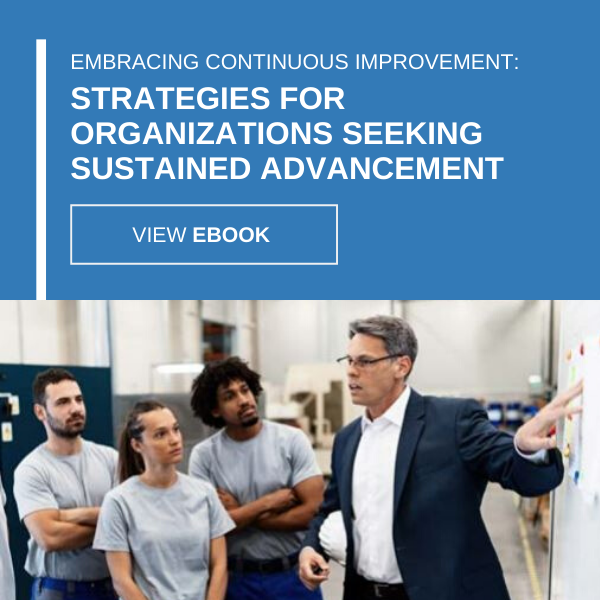
With ‘Fresh Eyes,’ Consultants Can Help Improve Organizational Efficiency
At many organizations, managers often opt to come up with new ideas or solutions to dilemmas using their own resources and employees, rather than bring in an external consultant or firm.
In these cases, management-level decision makers have typically been averse to the idea of setting aside further funding to pay for services perceived to be already available in-house — a mindset that may hinder progress and overall efficiency. Sometimes, the only way to come up with the most common-sense solutions involves bringing in a set of fresh eyes as a means of weighing all available options.
Organizations that have traditionally avoided consultants have had provided understandable reasons for doing so, whether it be that they are concerned about consulting fees on the specificity of a project’s scope, that consultants can be too independently minded, or that bringing them onboard will impact the morale of regular employees. If handled correctly through strong communication and undertaken with a clear approach in mind, organizations can avoid these issues when hiring a consultant or consulting agency — and reap only benefits.
Why hire a consultant?
As objective, independent arbiters that can analyze any aspect of an organization — past, present, and future — consultants’ decisions are not inherently biased in that they are influenced by ongoing practices that may, in turn, be the cause of any operational deficiencies. While internal employees may have some of the expertise needed to solve a problem, consultants can specialize specifically in a number of different fields, from manufacturing and human resources to finance and information technology, according to Mind Tools.
While internal employees may have some expertise needed to solve a problem, consultants can specialize in a number of different fields.
As Consultant’s Mind notes, consultants are hired based on their “ability to make the complex simple, and drive decision making and action” and to “help leaders make change” to ensure their organizations move forward, and not in reverse. Other areas that consultants focus on include leadership development, change management, and overall organizational strategy.
Some common situations in which an organization may bring in an outside consultant for assistance include crises or mergers and acquisitions. Due to the fact that many are hired on a contractual basis, consultants are also convenient because their contract can be terminated more easily than an in-house employee if desired results are not achieved.
While they are hired for relatively limited timeframes, consultants carry out work that can affect an organization for years to come. As a result, a client should develop a knowledge management plan to observe a consultant’s work and observe his or her techniques and approaches. In conjunction with cross-training teams of employees on these skills before a consultant’s contract ends, a knowledge transfer process should also be incorporated into a project. After all, once the consultant or consultancy team leaves, a company’s own employees will be responsible for picking up where the project was left off.
How to maximize consulting success for all involved
Many businesses today seek to make the most of their existing resources to create growth to avoid investing in any new, expensive and time-consuming capital improvements. In some cases, the lack of performance in improvement teams isn’t tied to a lack of investment, but from high-level organizational issues. For instance, three scenarios that USC Consulting Group consultants encounter in projects that lack strong performance from their improvement teams are unrealistic or overwhelming demands, flawed operational objectives, and workflow processes that are reactive, rather than proactive. Consultants can help identify those organizational issues to enhance how internal teams work.
Many businesses and other organizations today are seeking to make the most of their existing resources to create growth, but without investing in any expensive and time-consuming capital improvements.
To begin the consulting process, Mind Tools recommends that both the client and consultant should establish a balanced relationship in which the latter’s role is clearly defined and controlled in terms of the limits of its project scope. At this point, the consultant should be provided with a company’s mission or vision statements and other important information, such as key stakeholders and (in some cases) ongoing office disputes. It is further advised that a hired consultant begin getting acquainted with or starting the project as soon as possible; often times, consultants prefer to work with measurable “smart” goals Organizations should always monitor and track their new contractors’ progress and provide feedback to ensure the entire process is comfortable and convenient for both parties involved.
Solutions employed by consultants in response to clients’ issues include aspects like communications improvement, creating and quantifying new operational metrics and the implementation of auditing and easy-to-deploy training programs. Often times, an organization’s internal improvement teams are siloed into their own operations because they do not maintain or even develop lines of communication with other teams to facilitate organization-wide progress. With regard to the quantification of new metrics to help drive an organization away from reactive practices, a consultant might suggest the adoption of certain key performance indicators. In doing so, teams can direct more of their focus to work on more overarching goals and projects with the purpose of driving growth and increased revenue. While businesses may have consistent training programs in place, poor quality documentation and auditing can in turn result in programs that are not aligned with what are truly best practices and workers end up learning substandard processes.
At USC Consulting Group, our consultants have implemented solutions that help businesses improve their bottom lines for over 50 years. Connect with us today to speak with one of our consulting professionals about how we can help your organization improve operational performance.







